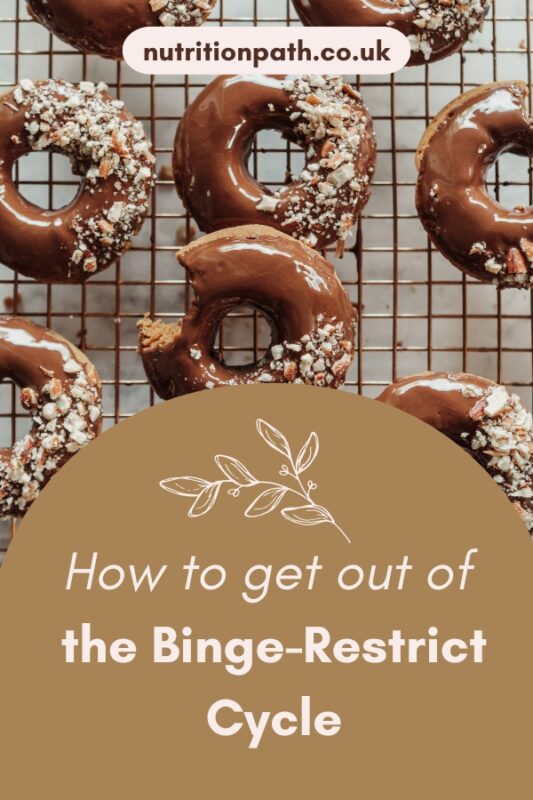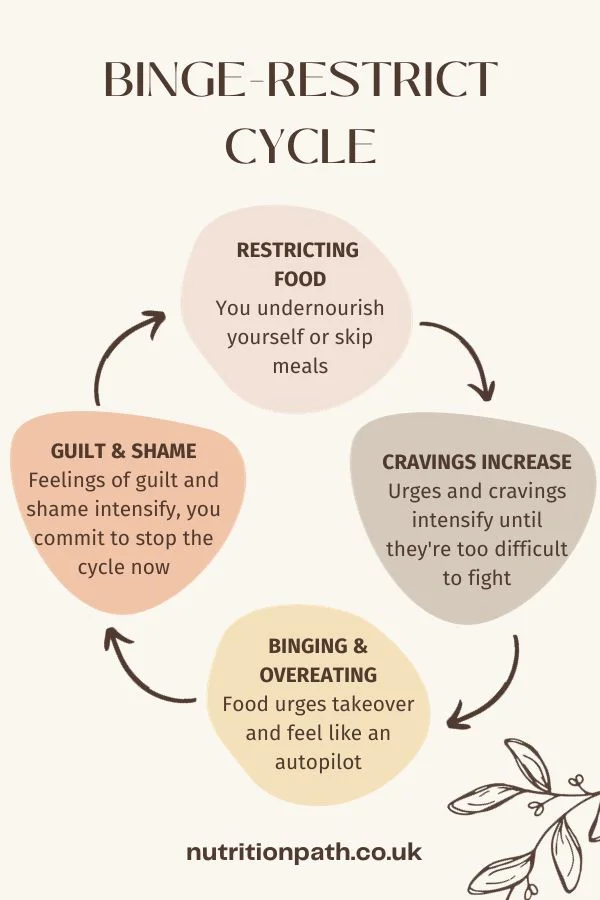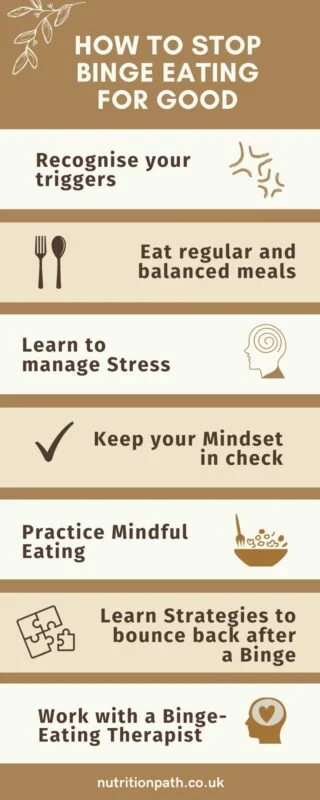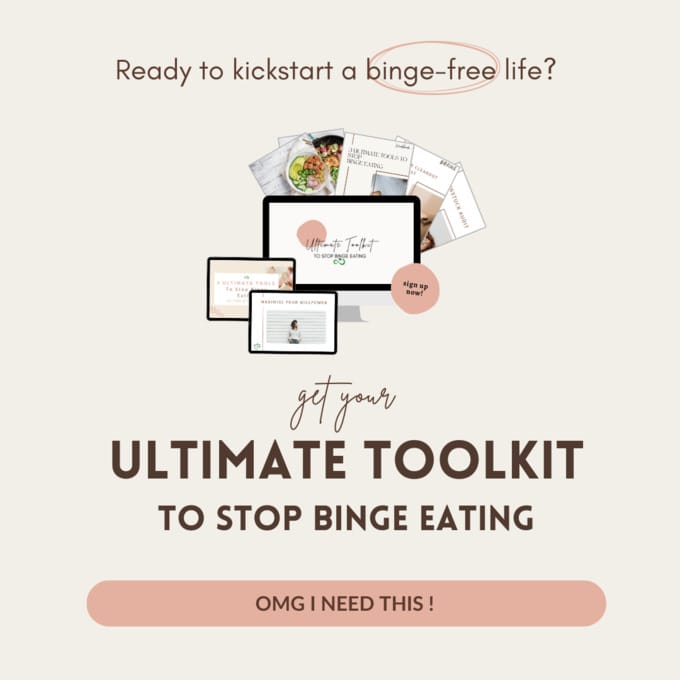Do you think about food 24/7? Or go over what you should or shouldn’t eat in your head? Or experience intense food guilt or shame that feeds the binging cycle?
If that sounds familiar, you may be stuck in a binge-restrict cycle, which can feel like a physical and emotional rollercoaster and I’m sure you want out!
And the worst thing about it? You may feel completely alone and embarrassed to talk about it. And this may prevent you from seeking support and much-needed help to stop binge eating for good.
The good news is, that there are tried and tested strategies on how to stop binging that have worked for hundreds of my clients and helped them create a healthier relationship with food.
Let’s explore some key strategies to get out of the binging cycle, make peace with food and start to enjoy eating again (yes, it’s possible!).
Am I binge eating?
We are in the era of social media eating trends, influencer “what I eat in a day” plates. Plus countless women around sharing their ongoing dieting struggles. I get it, it’s increasingly challenging to recognise what “normal” eating even looks like. It can be difficult to figure out whether overeating sometimes is just a part of life or if it’s already becoming disordered eating.
If you are often confused and ask yourself “Am I binge eating?” here are some clues that will help you figure it out:
Signs that you are Binge Eating
- Eating large amounts of food in a short space of time: Binge eating typically involves consuming excessive quantities of food within a shorter timeframe than usual, ranging from minutes to a few hours.
- Feeling out of control: During a binge episode, you may experience a sense of helplessness and lack of control over food. It can feel as though you are unable to stop.
- FAST eating: Binge eating often means devouring your food, large quantities of food without fully savouring or enjoying it. It may feel like an automatic, mindless process.
- Eating beyond the point of fullness: Continuing to eat even when you feel physically uncomfortable or overly full.
- Secret eating or hiding the evidence: A tendency to eat in secrecy, driven by feelings of shame or embarrassment. You may bin or hide food wrappers or containers.
- Intense guilt or shame afterwards: Following a binge episode, it is common to experience feelings of guilt, shame, or regret about the episode.

Learnings from the Minnesota Starvation Study
If you’ve ever dieted or restricted your food intake, labelled foods as “good” and “bad,” or have a history of disordered eating patterns, you know that it’s a slippery slope.
Ever heard of the Minnesota Starvation Study conducted by Ancel Keys during World War II? It’s a cornerstone study that explains the effects of restriction and dieting on the mind and the body. This includes the overwhelming obsession with food.
In the semi-starvation study, participants had 24 weeks of severe calorie restriction with considerable weight and body fat loss. During the study, participants started to become fixated on food, daydreaming and thinking about it 24/7. And this was likely due to the physiological and psychological effects of food deprivation.
Hormonal changes, increased hunger and reduced satiety, with the constant focus on weight and appearance triggered an obsessive mindset around food. Sounds familiar?
Although this is quite an old study, the learnings are perhaps even more relevant today. It shows that when the body is deprived of solid nourishment, it instinctively responds by increasing hunger cues and intensifying food-related thoughts. It can often lead to disordered eating, food obsession and most likely overeating and binging.
If you find a lot of similarities to your relationship with food and body in the study, take a moment. What’s your relationship with food right now? What’s your history with dieting or restriction? Can you pinpoint when you started thinking about food 24/7?

Get your FREE Cheatsheet
9 MINDSET MISTAKES
THAT KEEP YOUR STUCK
IN THE BINGE CYCLE
What is the Binge-Restrict Cycle?
It’s a pattern of behaviour, which has both periods of restriction and episodes of overeating or binge eating as a consequence. Then the feelings of guilt and shame, lead to further food restriction. Let’s explore what happens at each stage of the cycle.
- Restricting Food: The cycle often starts with intentional food restriction. Whether due to diet culture, body dissatisfaction, or health concerns, food volume is restricted or certain food groups are cut out. This restriction can trick the body into thinking it’s facing a food shortage, triggering physiological and psychological reactions as survival mechanisms.
Often, even mental restriction in the form of diet mentality can propel the cycle of binge eating. - Cravings Increase: As a natural response to deprivation, the body increases hunger cues and cravings, particularly for calorie-dense foods. Mentally, thoughts and fantasies about food can suddenly increase, and you find yourself constantly thinking about your next meal or snack.
- Overeating and Binging: As the cravings intensify, the willpower to maintain food restriction and “being good” reduces, which can lead to binge eating episodes. This isn’t just about a lack of self-control or willpower, but rather a physiological response of food deprivation.
- Guilt and Shame: After episodes of overeating or binging, feelings of guilt, shame, and self-loathing soon follow. The intensity of emotions and fear of weight gain can lead to promises to “be good” and restrict food again, completing the cycle and also starting it all over again.
Understanding the binging cycle is key in breaking free from it. If you’re stuck in the cycle for years, decades or as long as you can remember, keep reading on what you can do now to stop binging. Also, find out how to seek support from professionals who specialise in eating disorders and disordered eating patterns.

How to stop binging for good
Stopping binge eating and breaking the vicious cycle can be challenging, especially if you’ve been dieting or restricting for years (sometimes even decades). However, with the right tools and strategies, it is possible to learn how to stop binging for good.
Here are some key points to get started to will lead you towards a happier and healthier relationship with food and your body.
1. Recognise your triggers
Ever noticed if you binge at a specific time of the day? Or perhaps it’s after you have that phone call with your Aunt Sally every other week? Or maybe, it’s triggered by constantly seeing the cupcakes in the kitchen your kids made on the weekend?
Identify trigger foods, situations, or environments that lead to binge eating. Avoid them consciously by removing trigger foods or finding alternatives for comfort foods. However, this is only a short-term solution, as eliminating trigger foods long-term will only increase cravings for “forbidden” foods. This can be a form of mental restriction, so become aware of the “good foods” and “bad foods” labelling.
Work on your relationship with food and change ingrained patterns in the meantime. Once you feel confident, slowly reintroduce trigger foods to break associations with binging.
You may also find that you need to put other boundaries in place, such as speaking to Aunt Sally when you are rested and relaxed. Or spring-cleaning your Instagram account. Especially if every second influencer you follow is making you feel like you’re eating habits or exercise routines are below par.
2. Mindful nutrition: regular and balanced meals
While binge eating and food obsession may not be entirely about food, food can certainly be a mediator in the binging process. So it’s key to make sure that you’re well-nourished! Try to create a routine by having regular, balanced meals and snacks throughout the day.
Skipping meals or going long periods without eating can trigger hunger and food cravings and catapult you into a binge. Alos remember that restrictive diets, as well as the eliminating entire food groups can lead to increased binge urges.
Aim for balanced meals that include protein, beneficial fats, and fibre. This will help keep you satisfied and stabilise blood sugar levels.
Swap simple carbohydrates with complex carbohydrates where possible. Swap white flour and bread to wholegrain bread, beans and lentils and wholegrains. This will help avoid the spikes and crashes of blood glucose.
3. Learn to manage stress
Managing stress is crucial in overcoming binge-eating habits. Food often becomes a way to cope with stress or find comfort. By effectively managing stress, you can learn how to stop binging and regain control over your relationship with food.
Start with simple acute-stress management techniques like practising breathing exercises. Breathing can quickly reduce cortisol and adrenaline levels, promoting relaxation. Try box breathing (4-4-4-4), 4-7-8 breathing, or a technique you learned in your yoga or meditation class.
For chronic stress, focus on self-care and activities that promote relaxation and well-being. Take breaks at work, spend time in nature, indulge in a bath or cosy up with a blanket and a cup of tea. Join a group or engage in hobbies you enjoy. Most importantly, make time for activities that bring you joy and feel authentic to you, even if it’s just 10 min a day.

4. Keep your mindset in check
In order to keep your mindset in check when learning to overcome binge eating and food obsession, it is crucial to challenge diet culture. Question societal messages that promote restrictive eating or dieting behaviours.
This involves surrounding yourself with positive, body-affirming influences that encourage a healthy relationship with food. Find people, community or social media accounts that are supportive and are aligned with your mental health goals.
Additionally, practising self-compassion is key throughout this journey. It is so important (and hard) to be kind to yourself. Recognise that overcoming binge eating is a process that may involve plenty of setbacks and is not linear. It is also important to set realistic goals and understand that recovery takes time.
Also, essential to manage the fear of weight gain or impatience towards weight loss. Recognise, if this is a clear trigger for you, that sabotages your progress, creates negative emotions and intense cravings.
Sustain your motivation by setting goals that are actually achievable and realistic to maintain. Also helps you avoid feeling discouraged while learning how to stop binging. If binge eating and disordered eating have been with you for a while, it may take a little while to make peace with food, yet patience is essential.
5. Practice Mindful Eating
Mindful eating is a super powerful tool to stop binge eating, although it can be challenging to start practising it. Start with fully focusing on the food you’re eating and enjoy each bite. Avoid rushing through your meals or barely tasting them. Take the time to appreciate the appearance, smell, taste, and texture of your food.
Instead of mindlessly hoofing food down or eating in response to emotional triggers, mindful eating encourages conscious eating. It can help create a more natural and balanced relationship to food. It also helps reduce the guilt that comes with eating certain foods, like chocolate, sweets or processed foods. Working with your hunger and fullness cues also promotes satisfaction with each bite.
Recognise, if there are specific food rules at play. This is guidance that comes from your mind, rather than the body and is a form of dietary restriction. Therefore, an attempt to create control around food leads to loss of control, intense cravings and emotional eating.
When eating for well-being and not for the diet, mindful eating can be instrumental in beating binge eating. When compulsive eating is behind you, aim to explore intuitive eating as the next step.
6. Learn strategies to bounce back after a binge
The path to overcoming binge eating is rarely linear. Relapses do happen and are a part of the process. If a relapse occurs, recognise that you haven’t failed. View every “failure” as an opportunity to grow and get really good at recovery skills.
It’s crucial to be kind to yourself during the recovery process. Guilt and self-blame are not productive! Instead, remind yourself of your big WHYs and progress you’ve made so far. You’re doing so well!
Figure out what helps you bounce back after a binge eating episode and helps you feel mentally and physically better. Does having a balanced nourishing meal help? Perhaps taking a long walk or calling a close friend seems to make the process easier.
Focus on your favourite strategies and techniques to look after and soothe yourself, rather than punish or get back into the binging cycle. If it helps, compile a list of your go-to strategies and keep it at hand to use after binge eating.

7. Work with a Binge-Eating Therapist
It’s very possible to stop feeling obsessed with food and learn how to stop binging, but it’s crucial to seek professional help. Your doctor can provide further guidance on available support or private support may be available.
It is often useful to have a combination of support, if available. In my clinic I aim to work as part of the team, where the client works with both a mental health and nutrition professionals. For example, working with a psychotherapist and counsellor and a nutritionist, nutritional therapist or dietician alongside. Working with a team of specialists means all the bases of overcoming binge eating are covered.
Choose a binge-eating therapist who specialises in eating disorders and disordered eating patterns. Also the one, which has additional professional training in eating disorders, ensuring you get the best support available.
It’s possible to end the binge-restrict cycle
Overcoming binge eating can be a challenge, especially if you tried it many many times before and are not sure, what will actually work. The key to lasting recovery is often about the small steps taken daily, that get you closer to a healthier relationship with food. Recovery is not an overnight success, but rather a bunch of tiny actions towards better stress management, nourishment and self-care.
It’s also about seeking professional help from a team of experts who can provide guidance and support throughout this journey because it’s much easier to go with somebody, who knows the way out!
Remember, it’s not about perfection, but progression. Small steps every day to feel better is what truly counts, no matter how small. Overcoming binge eating is possible, and the first step to recovery starts with you!

FAQ on how to get out of the binge-restrict cycle
- What is the binge-restrict cycle? Why it’s not good for my health?
It’s a repeating pattern, that is created by depriving yourself of food, which then leads to overeating and binging. Then, the shame and guilt increase. This cycle feels out of control and can affect physical and mental health. - How can I stop the binge-restrict cycle?
The key is to stop restricting and establish a regular eating pattern, which will help balance blood sugar levels. Then, you can start to observe emotional triggers. - Why does the binge-restrict cycle happen?
Physical restriction of food can lead to overeating and binging. Then, guilt and shame come in and keep perpetuating the cycle. The thoughts are often fuelled by weight loss. - What are the long-term consequences of the restrict cycle?
Being stuck in the cycle can negatively affect physical health by increasing inflammation, weight and nutrient deficiencies. Also, mental health can be severely affected. - How can I stop going back to the binge-restrict cycle?
Start with regular foods, that include all three macronutrients to nourish yourself well. Then, make sure you have your next meal even if a binge happens. Forgive yourself after the binge and remember that it is a learning event, not a failure.





9 thoughts on “How to Get Out of the Binge-Restrict Cycle”